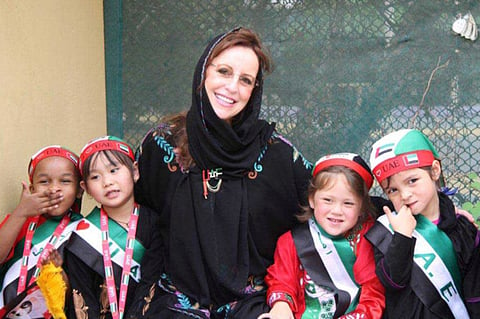Hone your child’s mind through creative skills
Music, story telling and enacting words and feelinmgs makes young minds develop fully

DUBAI
Nursery or pre-kindergarten education is a crucial phase in providing the right building blocks to a child’s personality where music, story-telling and performing arts playing a major role in the development of critical language and motor skills, imagination, and creativity of a child.
Educator Geraldine French, an early learning specialist, says: “Children need activities which require their own imaginations to be active. Development of imagination is one of the most significant functions of storytelling. Storytelling also teaches children a great deal about the use of language, narrative form, interaction with others and how to live morally.”
Most nurseries devote a major part of their learning curriculum to these aspects where learning takes place subconsciously as the activities in a nursery are designed around these, helping the child develop social skills, respond to melody and rhythm and co-ordinate his aural and physical skills.
Music a strong medium
At Indigo Valley Nursery (IVN) in Ghusais run by Bernadette King, veteran educator and proprietor, music forms an important part of the everyday curriculum. The nursery integrates children that require special learning skills with the mainstream, and music has plays a therapeutic role.
Bernadette says: “Music is part of everyday life at IVN. We create this musical environment in different ways: weekly music sessions with a specialised music teacher; weekly African drumming sessions with a specialised drum circle facilitator; making use of music resources in classrooms; playing soothing classical music from the entrance gate through to the dining rooms and play areas. Making use of all these aspects of music provides our nursery children with an environment that enables them to learn, discover and develop to their fullest, unique potential.”
The weekly music sessions start off with children singing simple action songs. This allows each child to develop speech and language skills as they familiarise themselves with the lyrics. Simultaneously, they are learning to express themselves in a non-verbal way by performing the actions with the songs. Example: The song Open, shut them, wherein the children’s’ vocabulary is expanded by learning opposites and their use of the appropriate hand gestures to symbolise the lyrics non-verbally. Many of these action songs are valuable in ensuring children’s’ emotional development. Five Little Pumpkins associates each number from 1 to 5, with a different emotions (happy, sad, angry, etc.) and the children not only love performing this song but are aware of how they can communicate and express their feelings.
This is often followed with a movement activity set to music. This can range from a simple ‘jumping songs’ to create opportunity for large movements to a more challenging activity such as ‘ball balances’ where each child is given a ball and is required to perform movements with the ball in sync with the music, which helps balance, posture, coordination and focus.
Storytelling
If music is an important tool at IVN, storytelling has been recognised as one of the most important methods that can be employed in the development of imagination and literary sense of a child. At the Small World Nursery, Heidi Phillips, nursery educator, says: “Most of us have heard the saying ‘children learn best through play’. At Small World Nursery, I understand how true and important this adage is when I witness it every day with the children I teach. Storytelling, music and performing arts are all forms of expression and communication, interconnecting and weaving the threads of our imagination; social activities which help develop our interpersonal abilities.
“For children, learning to talk is one of the most important skills they will achieve and as parents and educators, we can actively support this skill that will last a lifetime,” says Heidi.
Reading aloud, she says, helps build their language skills. “It’s fun, we are talking, listening and creating imagination when storytelling. We make and use story sacks, where stories come alive with the use of puppets and props, inviting children to interact and respond.
“Story telling can be a rhyme, in other words ‘singing a story’; children hear rhythm in words not just music. Rhymes contain rhythm, sounds and pitch. I sing action rhymes with the children, encouraging them to exercise their fingers by stretching, curling and isolating them. This develops dexterity.
“Through music and dance, children learn to manage their whole bodies with direction and coordination.”
A story a day
Every nursery has adopted some version of storytelling to engage the imagination of the child. At the British Orchard Nursery, they have honed story-telling into an art. Proprietor Vandana Gandhi, says, “Teachers at our nursery recognise that stories bring to life events and situations and help children to make sense of their world, whilst developing their imagination. Books are invaluable in supporting children’s learning across all areas of development, encouraging them to acquire knowledge, process cognitive thoughts, bring them together culturally, and develop creatively and emotionally.”
Vanessa Maguire, business support manager, British Orchard Nursery, elaborates: “Our children listen to stories everyday using books large and small, story sacks with props, stories and musical instruments together for dramatic effect.
“Sound effects with objects or voice, wonderful expressions, tone of voice and enacting the story - all these bring the story to life.”
British Orchard strongly encourages parents to read aloud stories to their children at home and visit local libraries often.


